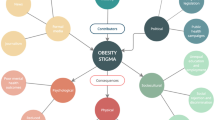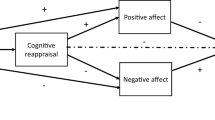Abstract
Mindfulness and mindful eating have become popular in recent years. In this review, we first explore what mindfulness is in the context of psychological research, and why it offers promise for eating behaviours and weight loss. Second, we review the main empirical findings for weight loss in mindfulness-based intervention programmes. Third, contradictions in the findings are explored in more depth, and suggestions are made regarding why they may be occurring. Fourth, the benefits of adding self-compassion (and compassion) training to mindfulness practise to assist weight loss is discussed. Finally, the limitations of the research literature (and possible solutions) are explored. Overall, it is concluded that while mindfulness meditations that specifically focus on eating may be extremely helpful in promoting better eating behaviours, and assist in weight regulation, work is still needed to make such interventions appeal to a wider audience.
Similar content being viewed by others
References
Papers of particular interest, published recently, have been highlighted as: • Of importance •• Of major importance
Organization WH. Obesity and overweight. Fact sheet no. 311. 2014. www.who.int/mediacentre/factsheets/fs311/en/.
O’Reilly G, Cook L, Spruijt‐Metz D, et al. Mindfulness‐based interventions for obesity‐related eating behaviours: a literature review. Obes Rev. 2014;15(6):453–61.
Kearney DJ, Milton ML, Malte CA, et al. Participation in mindfulness-based stress reduction is not associated with reductions in emotional eating or uncontrolled eating. Nutr Res. 2012;32(6):413–20.
Kabat-Zinn J. Mindfulness‐based interventions in context: past, present, and future. Clin Psychol Sci Pract. 2003;10(2):144–56.
Bishop SR, Lau M, Shapiro S, et al. Mindfulness: a proposed operational definition. Clin Psychol Sci Pract. 2004;11(3):230–41.
Cohen D, Farley TA. Eating as an automatic behavior. Prev Chronic Dis. 2008;5(1):A23.
Bargh JA, Chartrand TL. The unbearable automaticity of being. Am Psychol. 1999;54(7):462–79.
Tuomisto T, Tuomisto MT, Hetherington M, et al. Reasons for initiation and cessation of eating in obese men and women and the affective consequences of eating in everyday situations. Appetite. 1998;30(2):211–22.
Wansink B, Painter JE, Lee YK. The office candy dish: proximity’s influence on estimated and actual consumption. Int J Obes. 2006;30(5):871–5.
Alberts HJ, Mulkens S, Smeets M, et al. Coping with food cravings. Investigating the potential of a mindfulness-based intervention. Appetite. 2010;55(1):160–3.
Stanford MS, Mathias CW, Dougherty DM, et al. Fifty years of the Barratt Impulsiveness Scale: an update and review. Personal Individ Differ. 2009;47(5):385–95.
Peters JR, Erisman SM, Upton BT, et al. A preliminary investigation of the relationships between dispositional mindfulness and impulsivity. Mindfulness. 2011;2(4):228–35.
Geliebter A, Aversa A. Emotional eating in overweight, normal weight, and underweight individuals. Eat Behav. 2003;3(4):341–7.
Wegner DM, Schneider DJ, Carter SR, et al. Paradoxical effects of thought suppression. J Pers Soc Psychol. 1987;53(1):5.
Konttinen H, Männistö S, Sarlio-Lähteenkorva S, et al. Emotional eating, depressive symptoms and self-reported food consumption. A population-based study. Appetite. 2010;54(3):473–9.
Mantzios M, Wilson JC, Linnell M, et al. The role of negative cognition, intolerance of uncertainty, mindfulness, and self-compassion in weight regulation among male army recruits. Mindfulness. 2014:1–8.
Hofmann SG, Sawyer AT, Witt AA, et al. The effect of mindfulness-based therapy on anxiety and depression: a meta-analytic review. J Consult Clin Psychol. 2010;78(2):169.
Brown KW, Ryan RM. The benefits of being present: mindfulness and its role in psychological well-being. J Pers Soc Psychol. 2003;84(4):822.
Mantzios M, Wilson JC. Exploring mindfulness and mindfulness with self-compassion-centered interventions to assist weight loss: theoretical considerations and preliminary results of a randomized pilot study. Mindfulness. 2014:1–12. This study provides the lengthiest longitudinal account of mindfulness-based interventions, and also offers an additional account of the role of compassion in weight loss and maintenance.
Van Strien T, Herman CP, Verheijden MW. Eating style, overeating, and overweight in a representative Dutch sample. Does external eating play a role? Appetite. 2009;52(2):380–7.
Kristeller J, Wolever RQ, Sheets V. Mindfulness-based eating awareness training (MB-EAT) for binge eating: a randomized clinical trial. Mindfulness. 2013:1–16.
Daubenmier J, Kristeller J, Hecht FM, et al. Mindfulness intervention for stress eating to reduce cortisol and abdominal fat among overweight and obese women: an exploratory randomized controlled study. J Obes. 2011:1–13.
Niemeier HM, Leahey T, Palm Reed K, et al. An acceptance-based behavioral intervention for weight loss: a pilot study. Behav Ther. 2012;43(2):427–35.
Jacobs J, Cardaciotto L, Block-Lerner J, et al. A pilot study of a single-session training to promote mindful eating. Adv Mind-Body Med. 2012;27(2):18–23.
Marchiori D, Papies EK. A brief mindfulness intervention reduces unhealthy eating when hungry, but not the portion size effect. Appetite. 2014;75:40–5.
Timmerman GM, Brown A. The effect of a “mindful restaurant eating” intervention on weight management in women. J Nutr Educ Behav. 2012;44(1):22–8.
Miller CK, Kristeller JL, Headings A, et al. Comparative effectiveness of a mindful eating intervention to a diabetes self-management intervention among adults with type 2 diabetes: a pilot study. J Acad Nutr Diet. 2012;112(11):1835–42.
Mantzios M, Giannou K. Group vs. single mindfulness meditation: exploring avoidance, impulsivity, and weight management in two separate mindfulness meditation settings. Appl Psychol Health Well Being. 2014. The problems of different mindfulness meditations and the relationship to weight loss are critically explored.
Wansink B, Van Ittersum K, Painter JE. Ice cream illusions: bowls, spoons, and self-served portion sizes. Am J Prev Med. 2006;31(3):240–3.
Rolls BJ, Roe LS, Kral TV, et al. Increasing the portion size of a packaged snack increases energy intake in men and women. Appetite. 2004;42(1):63–9.
Hong PY, Lishner DA, Han KH. Mindfulness and eating: an experiment examining the effect of mindful raisin eating on the enjoyment of sampled food. Mindfulness. 2012:1–8.
Mantzios M, Wilson J. Making concrete construals mindful: a novel approach for developing mindfulness and self-compassion to assist weight loss. Psychol Health. 2014;29(4):422–41. This study is the first attempt to develop mindfulness without meditation, and provides preliminary data on the effectiveness of mindful (i.e., attentive and non-judgmental) eating on weight loss.
Kabat-Zinn J. Wherever you go, there you are: mindfulness meditation in everyday life. New York: Hyperion; 1994.
Kabat-Zinn J. Coming to our senses: healing ourselves and the world through mindfulness. New York: Hyperion; 2006.
Grossman P, Niemann L, Schmidt S, et al. Mindfulness-based stress reduction and health benefits: a meta-analysis. J Psychosom Res. 2004;57(1):35–43.
Grossman P, Van Dam NT. Mindfulness, by any other name…: trials and tribulations of sati in western psychology and science. Contemp Buddhism. 2011;12(01):219–39.
Shapiro SL, Carlson LE, Astin JA, et al. Mechanisms of mindfulness. J Clin Psychol. 2006;62(3):373–86.
Gilbert P. Compassion: conceptualisations, research and use in psychotherapy. London: Routledge; 2005.
Kelly AC, Zuroff DC, Foa CL, et al. Who benefits from training in self-compassionate self-regulation? A study of smoking reduction. J Soc Clin Psychol. 2010;29(7):727–55.
Ferreira C, Pinto-Gouveia J, Duarte C. Self-compassion in the face of shame and body image dissatisfaction: implications for eating disorders. Eat Behav. 2013;14(2):207–10.
Neff K. Self-compassion: an alternative conceptualization of a healthy attitude toward oneself. Self Identity. 2003;2(2):85–101.
Hollis-Walker L, Colosimo K. Mindfulness, self-compassion, and happiness in non-meditators: a theoretical and empirical examination. Personal Individ Differ. 2011;50(2):222–7.
Birnie K, Speca M, Carlson LE. Exploring self‐compassion and empathy in the context of mindfulness‐based stress reduction (MBSR). Stress Health. 2010;26(5):359–71.
Neff KD. Self‐compassion, self‐esteem, and well‐being. Soc Personal Psychol Compass. 2011;5(1):1–12.
Oken E. Maternal and child obesity: the causal link. Obstet Gynecol Clin N Am. 2009;36(2):361–77.
Woolhouse H, Knowles A, Crafti N. Adding mindfulness to CBT programs for binge eating: a mixed-methods evaluation. Eat Disord. 2012;20(4):321–39.
Alberts HJ, Thewissen R, Raes L. Dealing with problematic eating behaviour. The effects of a mindfulness-based intervention on eating behaviour, food cravings, dichotomous thinking and body image concern. Appetite. 2012;58:847–51.
Compliance with Ethics Guidelines
Conflict of Interest
Michail Mantzios and Janet Clare Wilson declare that they have no conflict of interest.
Human and Animal Rights and Informed Consent
This article does not contain any studies with human or animal subjects performed by any of the authors.
Author information
Authors and Affiliations
Corresponding author
Additional information
This article is part of the Topical Collection on Psychological Issues
Rights and permissions
About this article
Cite this article
Mantzios, M., Wilson, J.C. Mindfulness, Eating Behaviours, and Obesity: A Review and Reflection on Current Findings. Curr Obes Rep 4, 141–146 (2015). https://doi.org/10.1007/s13679-014-0131-x
Published:
Issue Date:
DOI: https://doi.org/10.1007/s13679-014-0131-x




